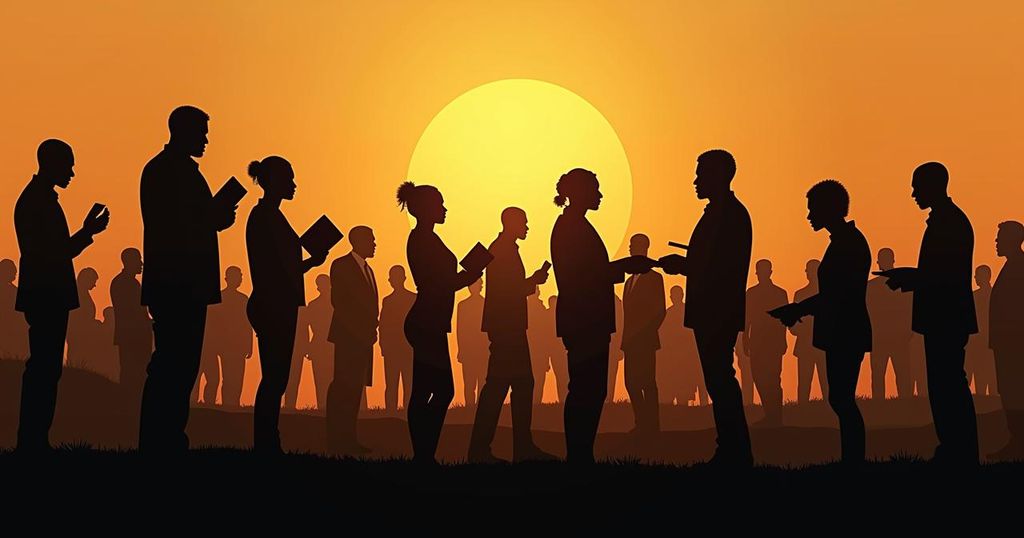Mozambicans Cast Votes in Pivotal Presidential Election

Mozambicans are voting in a critical presidential election where the ruling Frelimo party is expected to maintain control. With President Filipe Nyusi stepping down, their candidate, Daniel Chapo, emerges as a new figure. This election marks a turning point as Chapo is the first candidate not to have fought in the independence war, raising hopes for a change in governance amid serious economic challenges facing the country.
Mozambicans are participating in a pivotal general election, where the long-standing ruling party, Frelimo, which has maintained power for fifty years, is anticipated to secure another term. President Filipe Nyusi, who is concluding his tenure after reaching the two-term limit, was among the early voters when polling commenced at 07:00 local time (05:00 GMT) in the capital, Maputo. The Frelimo party has nominated Daniel Chapo, 47, a figure who gained relative obscurity prior to his candidacy, as their presidential candidate, presenting himself as a catalyst for change. His competitors include independent candidate Venâncio Mondlane, Ossufo Momade, a former rebel commander and head of the leading opposition Renamo party, as well as Lutero Simango representing the Mozambique Democratic Movement (MDM). This election is considered a watershed moment for Mozambique, as it marks the first instance where a Frelimo candidate did not actively participate in the struggle for independence. Chapo, born in the post-independence era, is perceived by many as a fresh face who has not been involved in the party’s historical corruption scandals. After casting his vote in Maputo, President Nyusi urged the public to maintain composure throughout the electoral process, stating, “I would also ask that no group of citizens agitates or threatens others, that everything happens in peace and tranquillity and that we avoid announcing the results ahead of time,” as reported by the AFP news agency. Over 16 million individuals are registered to vote in this election. Reflecting youthful sentiments on the electoral process, a 22-year-old student named Augusto Ndeve Pais expressed optimism: “I feel hopeful… People my age are worried about the future of our country, so I think they will vote,” as noted by Reuters. Analysts indicate that any new leader will face the significant challenge of fostering economic development and addressing the needs of a population where 62% lives below the extreme poverty line, surviving on less than $1.90 per day. Mozambique has been grappling with the aftermath of a civil war lasting from 1977 until 1992, and though the discovery of gas reserves in the north suggested potential economic revitalization, an ongoing Islamist insurgency since 2017 has stalled critical liquefied natural gas projects, despite foreign troop deployments. The counting of votes will commence after the polls close at 18:00 local time, with official results expected to be announced in approximately two weeks.
Mozambique has been governed by the Frelimo party since its independence from Portugal in 1975. The current election represents a critical juncture as the party has nominated a candidate with no prior role in the country’s liberation movement. The outgoing President Filipe Nyusi’s departure after two terms presents an opportunity for potential political change. Mozambique is still recovering from the ramifications of a prolonged civil war and has faced severe economic challenges exacerbated by social and political instability, particularly due to disruptive factors such as an ongoing insurgency in the northern region, combined with widespread poverty.
The election in Mozambique is a significant moment in the nation’s political landscape, characterized by the potential for change in leadership and governance. The youth’s interest in civic participation highlights the urgency for action on economic conditions. As the country awaits election results, the pressing concerns of poverty and developmental challenges remain at the forefront of national discourse.
Original Source: www.bbc.com






